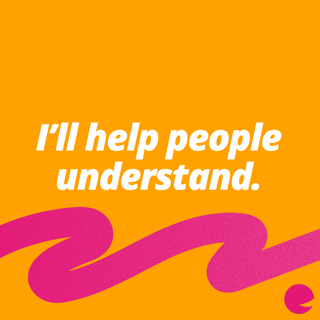Karen's Story

When I was struggling with my mental health in the past, I'd hide it because it "wasn't that bad" or "others have it worse", "there's no point in trying".
Sometimes I’ve hidden it because of something someone else has said. Once, I contacted the head of a department at uni, who had previously spoken about the support available for those mental health conditions, to say I was struggling. The response I got back was "everyone gets anxious". When I was failing the course and had to drop out, they asked why I didn't ask for help.
I will openly talk about my mental health now. It’s a good way to educate others on mental health conditions that have an "expectation" like OCD. I am also in a better place with mental health to do this. Many people will genuinely listen and ask questions, but I have come across those whose comments have been "just ignore it" or "everyone gets anxious". I’ve noticed that fewer people shy away from the conversation though, and that’s a positive thing.
Talking about mental health is one thing – it’s also important that we all come together to challenge stigma and discrimination when we see it. If someone who is struggling with an undiagnosed, or diagnosed, mental health condition mostly hears stigmatising comments, they will be less likely to seek support. Facing stigma or discrimination makes you feel like there’s something wrong with YOU and you'll never fit or have a ‘normal’ life.
When I have addressed comments by explaining what those conditions actually mean, people have genuinely listened to me. Looking back, there are times I've wanted to address comments but I haven’t, because I've been too nervous to or too worried about consequences.
That’s why I think it’s so important that we come together to tackle stigma. When you’re part of a movement, you are more confident, and together you have the knowledge to educate others.
Everyone has mental health. Not everyone is affected by a mental health condition in their lifetime but someone you know could or you could be affected in the future. Do you really want to have the only thing you know be assumptions and stigma?
Things are changing, and attitudes towards mental health have improved a lot in the last 10 years. When I left school in 2012, the only thing we had ever done around mental health was watch a video called "The A-Z of Mental Health" in PSE. Now, my work has an hour each month which is set aside for mental wellbeing, a wellbeing room, mental health first aiders, as well as information on how we can and should contact or use materials from occupational health regarding mental wellbeing, stress management and avoiding burnout.
Every little helps (don't sue me Tesco) but it is true. Every little question you ask someone when they make a comment that doesn't sit quite right – it gives them the space to rethink what they said and you the opportunity to explain.
